Ahwaz History
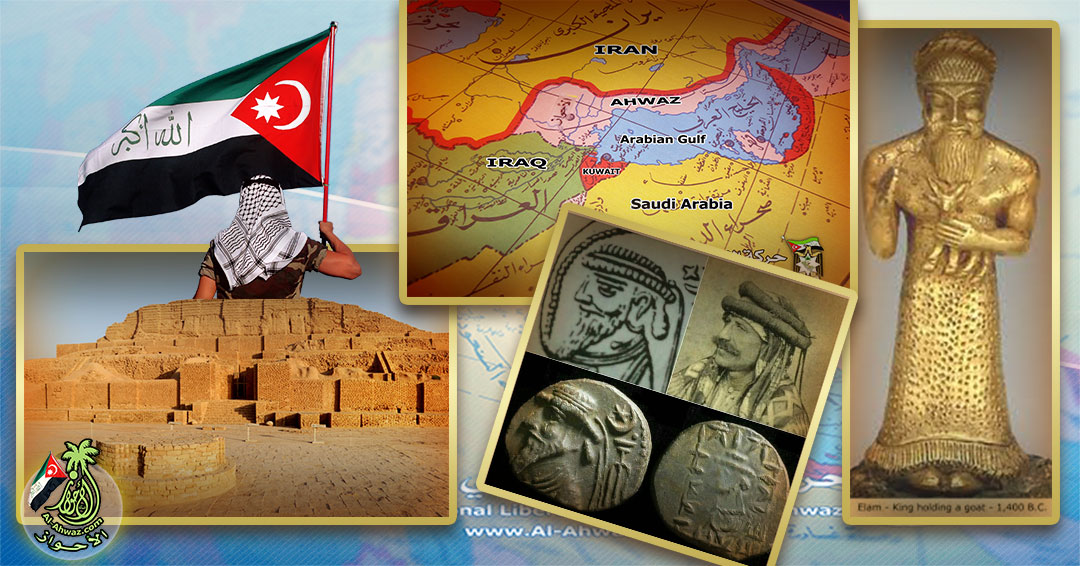
:Al-Ahwaz.com
Bief History of Ahwaz
The Flag of Ahwaz
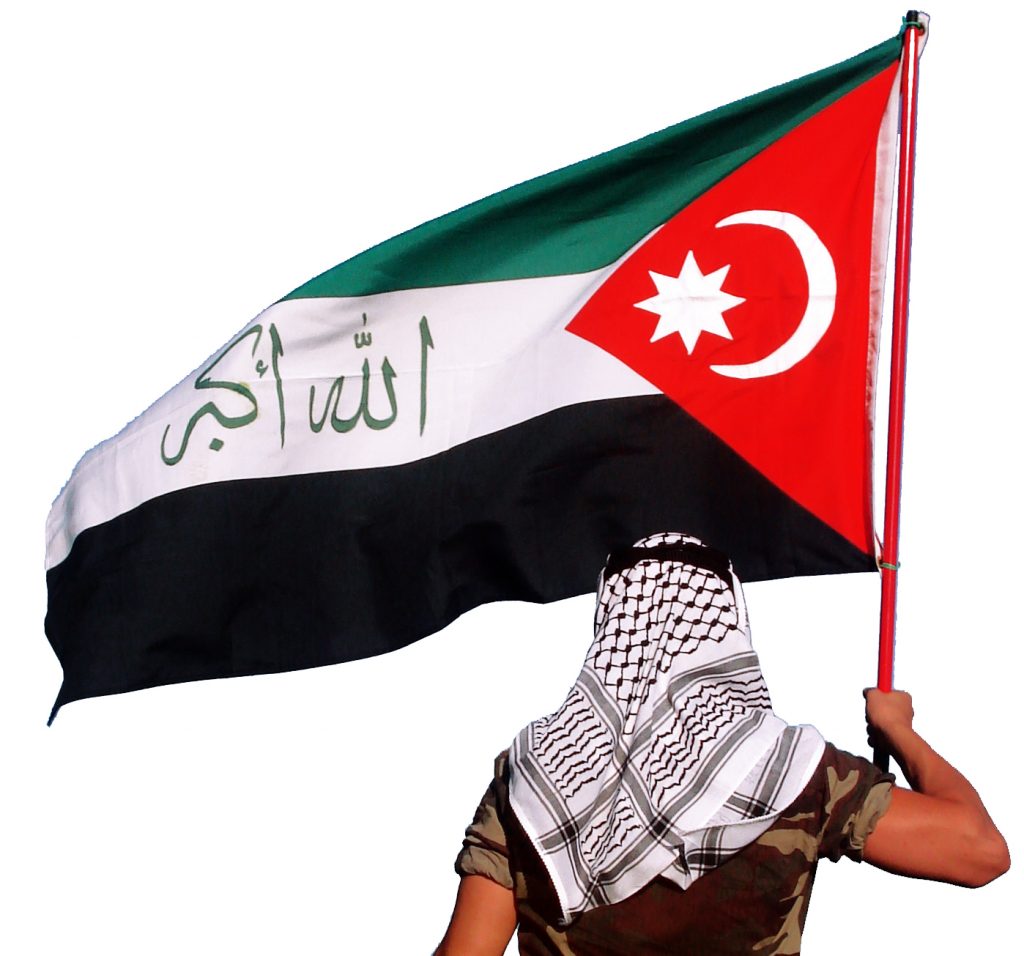
The flag of Ahwaz approved by the National Council of Ahwaz 1983
More information : https://ahwazflag.org/web
And http://al-ahwaz.com/arabic/history/ahwazflag/ahwazfag.htm
• Ahwaz has an area of 375.000 (square kilometers).
• Ahwaz limits, bounded to the west of Iraq, and the south-west of the Arabian Gulf and the Arabian Peninsula. From north, east and south-east mountains Zajros high altitude and the natural divide between Ahwaz, Iran.
• Ahwaz has a population of eight million Arabs.
• Ahwaz wealth : oil, natural gas, agriculture, natural resources other
• Ahwaz is one of the Arab countries that is located east of the Arab homeland.
• Ahwaz Arab homeland away and the usurped Arab parts of the Arab homeland.

The year 1925, is the year of the occupation of Ahwaz before the Persian in the era of Reza Khan Pahlavi dead, led by Gen. Zahidi, in alliance with Britain. Through covenants, promises and guarantees of a British prince Sheikh Khazaal Ahwaz (Governor Arabistan) Britain reneged on its promises and covenants, guarantees political for Ahwaz (home and the people) and prince invasion Arabistan committed during the commission of the crime of occupation Persian for Ahwaz support militarily and politically from Britain. On the night of the April 20, 1925, is the Black day in the history of Britain, which was a disgrace to Persia, history in the commission of the crime of perfidy and treason in Ahwaz peaceful occupation of its neighbor.
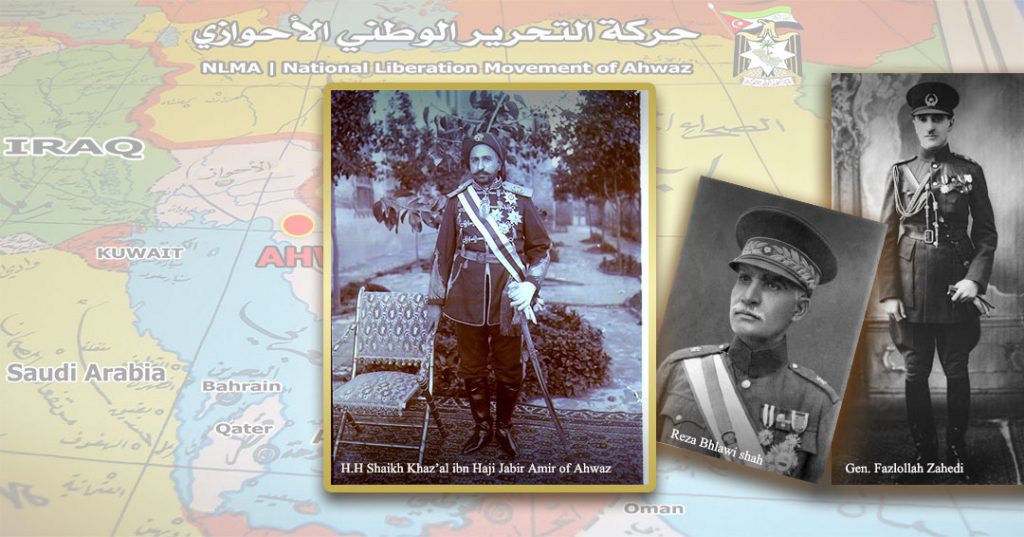
:Ahwaz or Arabistan introduction
Ahwaz or Arabistan (signifying the Arabic land character), is a region that is located cross from the South-Eastern part of the Iraqi borders.
Being the area surrounding the gulf from the North, beginning with the strategic Shatt-Alarab water gate (the current frontier between Iran and Iraq) and extending throughout the east bank of Arabian Gulf (called by native Arab people that inhabit Arabistan and named by the Arab World).
To lay out the location clearly, it is the area where Iran extracts all of the exporting oil from.
The land’s topographic, geologic characters and the barriers of Zagros Mountains make Arabistan geography a distinct one from the Iranian flat and naturally an extension of the Arab World land. This fact is again verified by historical characters later will be mentioned in this article. Arabistan is the country that is different from Persia as is Spain from Germany as Arnold Wilson noted in his journal.
However, the area of Ahwaz prior to its occupation by the Persians, 1925, it was 375.000 square km which later will be divided, in 1936, between couple new provinces after Persia taken over this region to its new territory called Iran.
These new changes still left a significant concentration of Ahawazi Arab native people in a province which named now Khuzestan. Aspire from all these was obvious. The Persian authorities wanted to hide any names that might refer to the ethnic characteristic of the native Ahwazi inhabitants.
:Ahwaz History
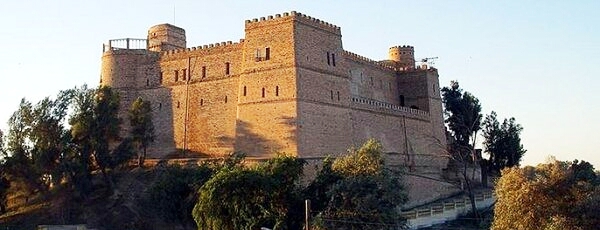
Ahwaz is known to be the land of Elam civilization. Susa had been the capital city of this civilization and Ahwazi native people also refer to it as the blessed land of Daniel prophet whose burial ground is located in today city of Shus or Susa.
Elam was one of the civilizations that existed, as a sister to the civilizations of Sumer, Assyria, and Babylonia and the historical sites of this civilization still exist throughout Ahwaz.
Elam civilization eventually was destroyed by the Persian during conquest, but Persians have never inhabited the land of Ahwaz since the hot climate was wild to their nature. French archeologists excavation between 1902-1901 on this site was the major one.
An Ahwazies origin is Semite, and later by the Islamic conquest Ahwazi as the Iraqis became Muslim and intermingled with Arabic tribes when they assumed tribal title and gradually abandoned their Aramaic language to Arabic. Still, there remained Ahwazies Christain, Jews, Sabian (followers of John prophet) to the present day forming 10% of the 8 million Ahwazi populations (tribal census not official ones).
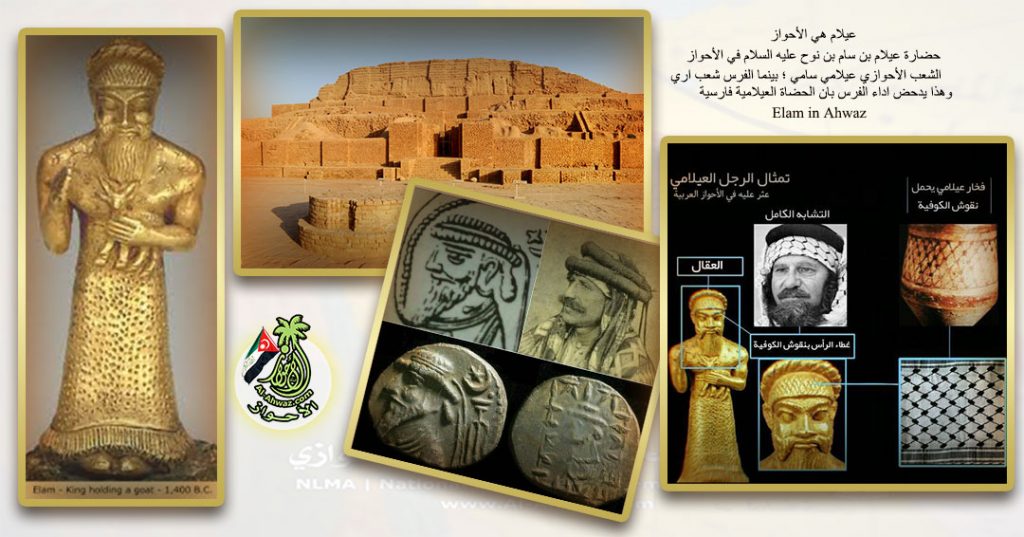
:Political History of Ahwaz
Finally Ahwaz emerged to be the first emirate to liberate itself form the Mongol rule and establish its autonomous territory under the rule of Mohammad Ibn Flah Mushashai who not only extend his rule on Arabistan and East bank of Arabian Gulf but also went as far as near Isfahan and Shiraz making Persians followers of his Shia’at doctrine. He officially ruled east and west bank of the gulf from today province of sharqia in Saudi Arabica to city of Bushaher on the other side of the gulf where Arabs are inhabiting.The capital of this emirate was Howaiza where bureaucratic governance system and currency were created. Their rule lasted from 1516-1690 when Al-bo-Naser takes the power and establish Kaabi emirate. Al-bo-Naser stayed in power for a century and half.
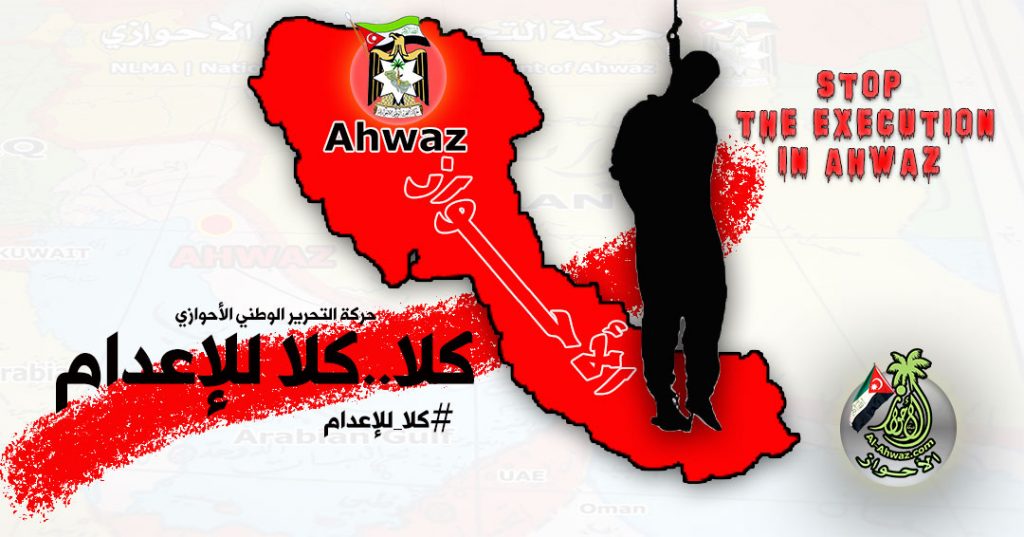
Their rule again was overtaken by Al-bo-Kaseb 1832 who will be predominantly the ruler for Arabistan until the time of occupation of Persia to Arabistan in the 1925 when the last Emir Shikh Khazal Al-Jaber was deposed by the Persian General Reza Khan who later became the King of a new country called Iran.
Although Arabistan was an immediate target of Persian’s and the Ottoman’s expansionism from the time of Moshashai, Ahwazies successfully kept their independence by intriguing between Persia rule and the Ottoman Empire. And, yet until 1925 this expansionism seized to submit Ahwaz to any perpetually rule which entails them to be taxed.
However, what will submit Ahwaz to Persia, not a surprise; happen to be the arrival of the colonizing powers and their desire in dividing the Middle East region according to the interests.
More specifically occupation, which later titled annexation, of Ahwaz was attributed to the following reasons. First, factor the treaty of Erzurum 1847 between British, Russia and Gajar of Persia where Ahwazi authority was ignored and a treaty took place against the will of Ahwazi people. The purpose of the treat was as noted: since1847, British and Russian interest in the Shatt al- Arab had changed dramatically; British oil discovery in Arabistan resulted in increased shipping on the Shatt al-Arab. Britain, in particular, was anxious to expand Persian sovereignty in the Shatt al-Arab, at least to the extent required by its own interest. This led to the second factors again another treaty in 1914 between Britain, Ottoman Empire, Russia and the Gajar’s. This time Britain was fearful from the Bolshevik revolution and their expansion which might reach the free sea through the Gulf region and U.S.S.R domination on the oil wells of the gulf region. The third factor was internal. The conflict between various tribes in Arabistan made the last Emir busy in his internal affair and diverted his attention from what was happening to the faith of his nations which later to come as result of these treaties. And, although the British considered Arabistan the protectorate or United Kingdoms, the last Emir shik Khzaal did not grasp the danger of this presence, which would later hunt him and his nation by occupation of Riza khan.
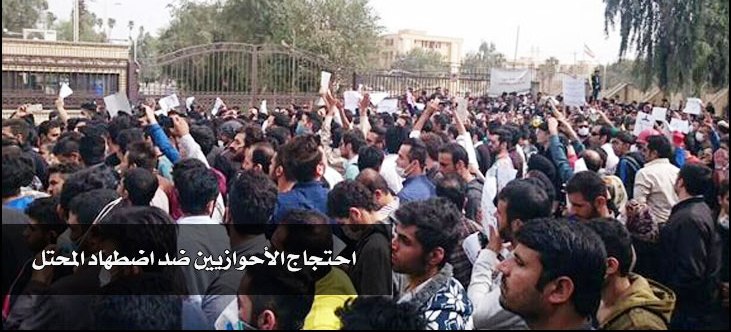
:History of Ahwazi political struggle for liberation
Although not continues, Ahwazies never had been stopped from their Struggle for their rights including the nation rights of self-determination. From the time of occupation, Ahwazies used all peaceful means of struggle to achieve their ends. Unfortunately their struggle has been often either ignored or not highlighted as a political struggle against Iran. There are several factors to this problem.
During the time of Shah, his persianist regime used all means to first disable Ahwaies from self realization, by prohibiting them from education in their language, eradication of any Arabic influence in Arabistan, and various policies to Persianize Arabistan.
Second, his regime primary policies was impoverishing Ahwazi population, assassination of political activists and containing the outflow of news which he tought it would it will put an end to Arabistan issue.
Third, as Iran enters to be recognized and known as a state in International community, Persians who owned all means of power in the institution deliberately fed the world with literatures which would sound Iran: Persia, unified country and if there is a sub-national minority they are no more than a separatist; and thus, their issue fall on Iran’s domestic security matter and not a regional political case. This to a large degree continues through the Iran’s Islamic regime as well. As result, the international communities were uninformed about the Ahwazi issue and therefore Ahwazi political fight was helpless and got little attention.
Forth, the Ahwazi fight was not supported by regional Arab states and if it was it was very limited and state’s interest targeted. The reasons that Ahwazi were not fully supported by the regional Arab states were cheaply: first, Ahwazies predominantly are Arab Shiaa. Since they were not Sunni they were less of a matter to the Arab world as was other cases. Second, Iraq always wanted to consider Arabistan as part of its soil as considered Kuwait, although they were two different cases. Therefore, Iraq regime prevented any other Arab states from interfering and claiming when the time was suitable. Third, Arab states has always been in a weak position faceting Iran which was and still seems to be a regional power. Therefore, why they would bother jeopardizing their relation since they well aware that Iranian regime are highly sensitive about the Ahwazi issue.
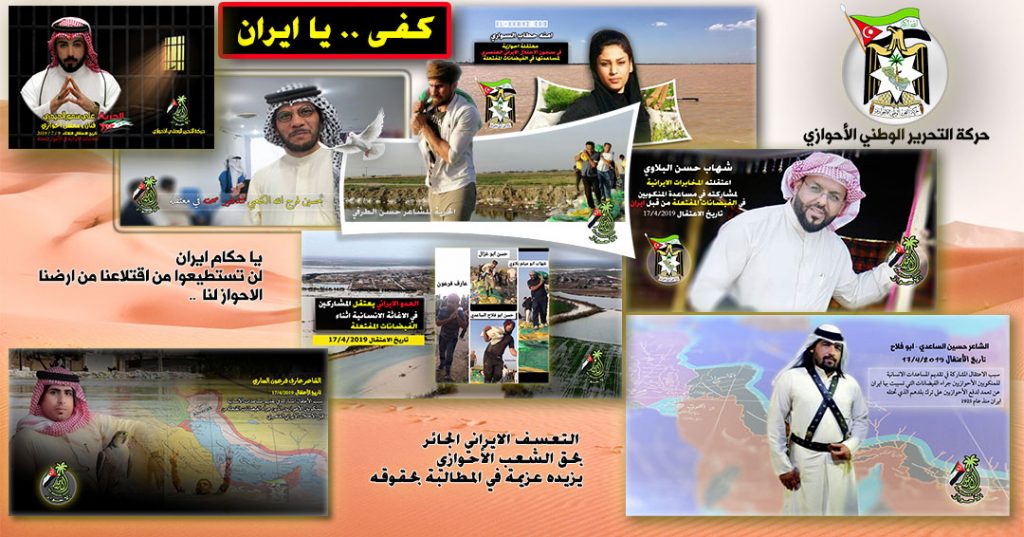
:Arabistan and Ahwazi political aspiration today
Since year 2000 Ahwazi were able to organize them selves, but now broad where they have the freedom of action and could work to influence the political struggle inside Arabistan. They successfully could influence the Ahwazies inside Arabistan which resulted in numerous demonstrations, act of civil disobedience and nonstop peaceful political fight. They also reached their voices to number of international organizations that watches over human rights issues around the globe. All of them unanimously condemned Iran for violating the human rights in Ahwaz.
Although all of these condemnation, Iranian regime continues to defy the will of international community and keeps on viciously persecuting the Ahwazi nation. The Iranian regime goes as far as confiscating Ahwazies’ land for settling Persians citizens in Arabistan aiming at changing the demographic character of Arabistan. These triggered anger among indigenous people, brought political consciousness to Ahwazies and more political unrest through out Arabistan.
As a consequences, the regime constantly attack demonstrating people with no mercy. In various incidents the Iranian armed forces opens fire to the crowds among them children and women and elderly. Their secrete service goes as far as abducting the political activists female espouses and sisters raping them aiming to break the sprite and the will of those activists and finally give up. In several occasion Iranian regime also plot bombs in public locations so that they easily could propagate against our peaceful political struggle and stigmatizing this just political fight with terrorism, and catching on excuses to arrest Ahwazi with no charges.
Today, on behalf of the Ahwazi nation we are asking you and all the international community to put pressure on Iran to give up the occupation, and the unjustified, and inhumane actions. We want your support and help to pressure Iran to respect the international law that yields all nations their rights and significantly law that allow Ahwazi’s right of self determination.
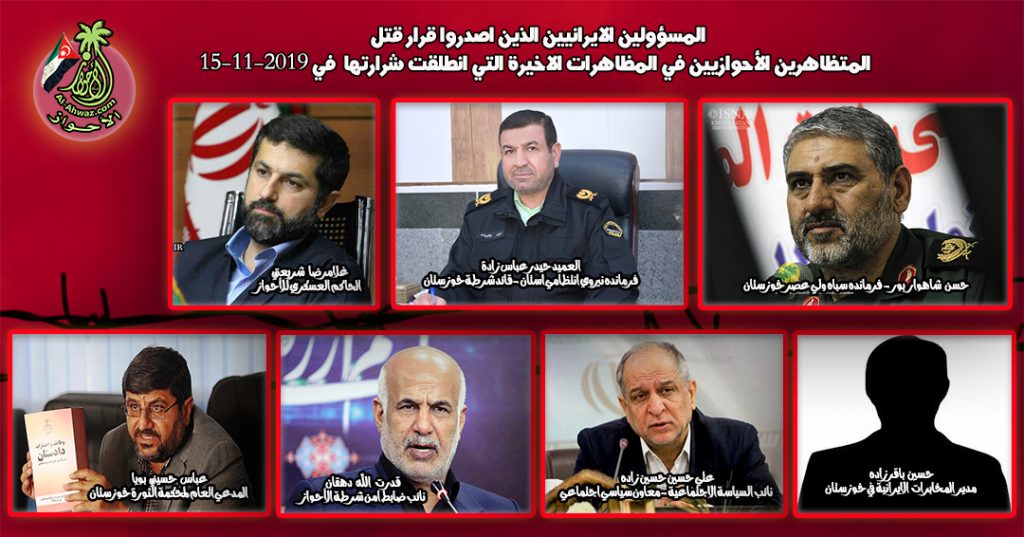
Ahwazis are a nation no less of a nation and not a different one from others. They would like to live in peace and prosperity, comply to the laws and norms of international community and contribute to humanity.
Ahwaz has all constituents of a nation; Ahwazis is distinct national identity from Iran. Ahwazi’s land is Arabistan, Ahwaz had its territorial integrity through out the history until 1925. Further, Ahwaz land has numerous natural wealth, being the world’s forth highest crud oil exporter and having various mineral resources. Ahwaz with spectacular strategic location, with unique fertile soil, extravagant climate and rich culture deserves to be a state of its own alike others.
More information about the historical Ahwaz, you can visit the home page: http://al-ahwaz.com/arabic/histor
:WEB
http://www.al-ahwaz.com
http://www.al-ahwaz.net
http://www.ahwaz.tv